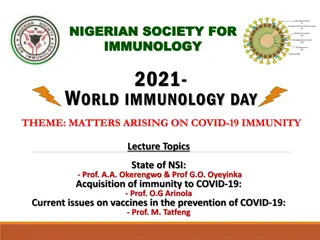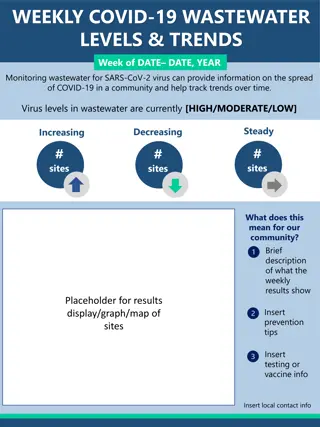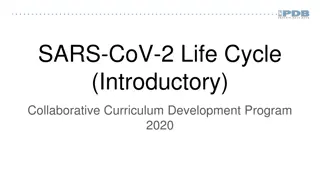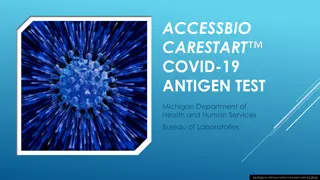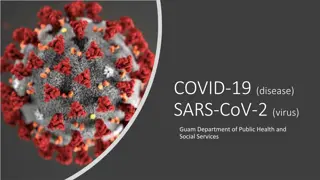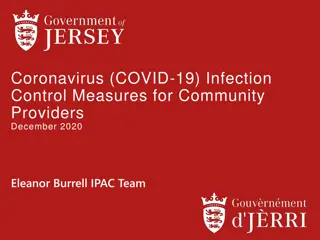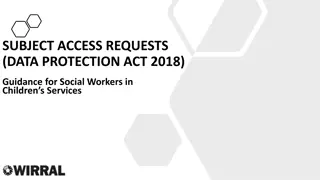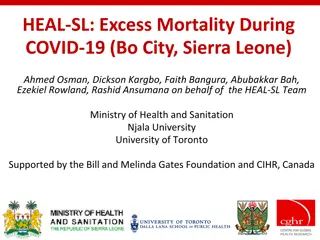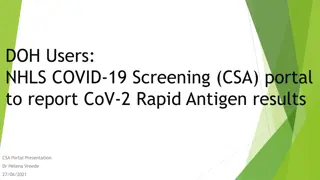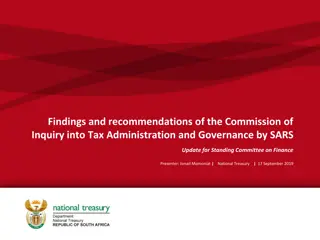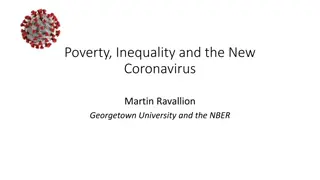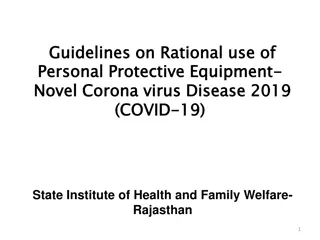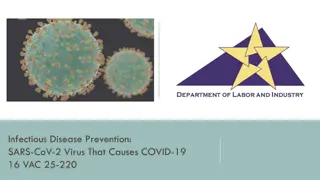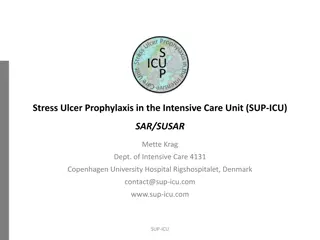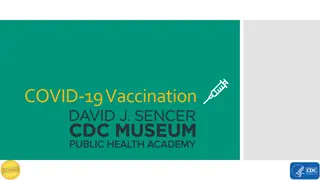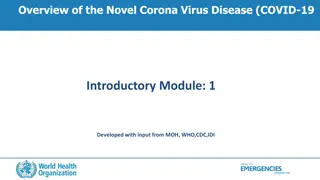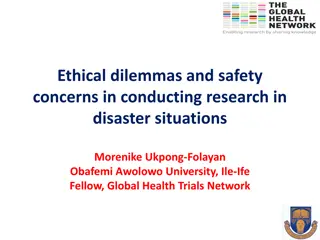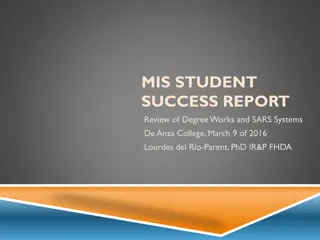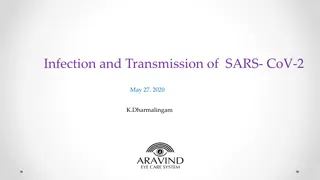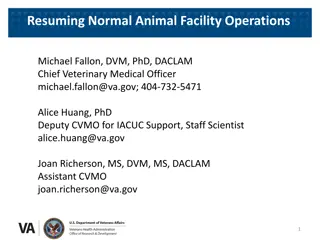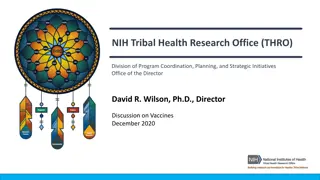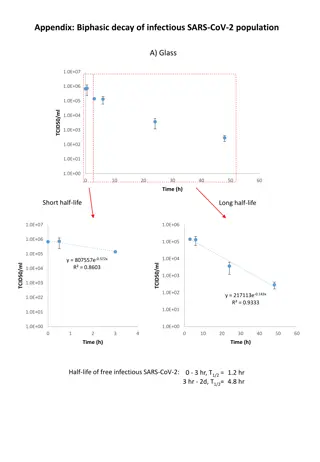South African Revenue Service SARS Presentation by Debt Management
Presentation by the South African Revenue Service (SARS) highlights their debt management processes, types of taxes collected, remedies and recourse available, and encourages stakeholders to comply with tax obligations.
26 views • 12 slides
Purpose And SARS Vision 2024
Automated refunds and drawbacks system of the South African Revenue Service (SARS). It explains the purpose, SARS Vision 2024, challenges with the current process, new refund and drawback process, benefits, and transitional arrangements.
1 views • 21 slides
Understanding SARS Tariff Determination Process
Explore SARS procedures for tariff determination and legislation provisions. Discover key discussions on customs, compliance, and international conventions.
1 views • 47 slides
2023 Tax Legislation Overview
The presentation by National Treasury and SARS outlines the 2023 tax bills and legislative process. It covers adjustments in values, updates on tax rates, implementation of carbon tax, incentive reviews, and more. The content details various tax bills, including the Rates Bill, Revenue Laws Amendmen
2 views • 80 slides
Overview of Distributed Systems: Characteristics, Classification, Computation, Communication, and Fault Models
Characterizing Distributed Systems: Multiple autonomous computers with CPUs, memory, storage, and I/O paths, interconnected geographically, shared state, global invariants. Classifying Distributed Systems: Based on synchrony, communication medium, fault models like crash and Byzantine failures. Comp
9 views • 126 slides
Insights on COVID-19 Immunity and Vaccines: NSI 2021 Lecture Highlights
Delve into the cutting-edge discussions from the Nigerian Society for Immunology's 2021 World Immunology Day event, featuring lectures on the state of NSI, acquisition of immunity to COVID-19, and current vaccine issues. Learn about the structural proteins of the SARS-CoV-2 virus, the importance of
4 views • 46 slides
Understanding Information Systems in Organizational Management
Management in organizations is divided into three levels: operational, tactical, and strategic. Each level requires different information systems to support various activities. Operational systems focus on routine transactions and control processes, while middle-level systems aid in semi-structured
9 views • 39 slides
Weekly COVID-19 Wastewater Levels & Trends - Monitoring and Analysis Report
Monitoring wastewater for SARS-CoV-2 virus levels provides crucial insights into COVID-19 spread and trend tracking in the community. The latest report for the week of October 16-22, 2022, shows moderate virus levels in wastewater with steady, decreasing, and increasing trends across different sites
0 views • 4 slides
Understanding the SARS-CoV-2 Life Cycle: An Overview
SARS-CoV-2, the virus responsible for COVID-19, follows a complex life cycle involving viral attachment and entry, replication and synthesis, as well as viral assembly and release. The virus interacts with host cell proteins to enter, produce essential proteins and RNA for reproduction, and then ass
1 views • 5 slides
Understanding CareStart COVID-19 Antigen Test Procedures and Safety Measures
This overview delves into the CareStart COVID-19 antigen test, touching on its approval status, intended use, safety precautions, how the test works, proper disposal and cleanup methods, and the importance of Personal Protective Equipment (PPE) during testing. The test involves specific procedures w
0 views • 18 slides
COVID-19 Overview: Guam Department of Public Health
COVID-19, caused by the SARS-CoV-2 virus, is a rapidly evolving situation. Information and guidance provided may be outdated. Coronaviruses can spread between animals and humans. Planning considerations for Guam include the likelihood of spread, high-risk populations, healthcare facility risks, PPE
0 views • 5 slides
COVID-19 Infection Control Measures for Community Providers
COVID-19, caused by SARS-CoV-2, is a viral disease that spreads through respiratory droplets. Common symptoms include fever, cough, and loss of taste or smell. Prevention measures include hand hygiene, PPE use, social distancing, and symptom screening. Staff should practice hand hygiene, cough etiqu
0 views • 11 slides
Introduction to Embedded Systems Design
Embedded Systems Design, Chapter 1 provides an insightful overview of embedded systems, distinguishing them from general-purpose computers. The chapter delves into the characteristics of embedded systems, their design considerations, and the various types of embedded computers such as general-purpos
1 views • 7 slides
Understanding Suspicious Activity Reports (SARs) and the Role of UKFIU in Tackling Illicit Finance
Explore the significance of Suspicious Activity Reports (SARs) in combating illicit finance, with a focus on reporting AML concerns, the role of the UKFIU, and the value of SARs in identifying money laundering activities. Learn about the quality of SARs, reporting breaches of standards and regulatio
0 views • 26 slides
Guidance on Subject Access Requests under Data Protection Act 2018 for Social Workers in Children's Services
This guidance provides information on Subject Access Requests (SARs) under the Data Protection Act 2018, specifically tailored for social workers in children's services. It explains what SARs are, how requests can be made, considerations for handling requests related to children and young people, an
4 views • 11 slides
Insights on Excess Mortality and COVID-19 Prevalence in Bo City, Sierra Leone
Study by the HEAL-SL team examines excess mortality during the COVID-19 pandemic in Bo City, Sierra Leone. Findings suggest potential underreporting of COVID-related deaths and highlight the importance of seroprevalence studies in understanding the impact of the virus. The research includes analysis
6 views • 14 slides
NHLS COVID-19 Screening Application Portal Guidelines
The NHLS COVID-19 Screening Application (CSA) portal is essential for reporting SARS-CoV-2 rapid antigen test results to the National Department of Health in South Africa. It is mandatory to report all rapid test results, including positive, negative, and invalid outcomes. Access to the CSA portal r
0 views • 14 slides
Findings and Recommendations of SARS Governance Commission Inquiry Update
The Nugent Commission of Inquiry into SARS identified a failure of governance and integrity under the former Commissioner, leading to urgent recommendations for removal and transparent appointment of a new Commissioner. The final report revealed instances of maladministration, mismanagement, and a p
4 views • 20 slides
NHLS COVID-19 Screening CSA Portal Information
Providing details on the NHLS COVID-19 Screening Application (CSA) portal for reporting SARS-CoV-2 rapid antigen test results. Accessing the portal, creating patient records, searching for patients, and more essential steps are covered. Find out how to obtain a user code, log in, and navigate the po
4 views • 11 slides
Role of Adhesion Molecules in Immune Response to SARS-CoV-2 Engagement
Engagement of SARS-CoV-2 triggers the complement system and TLR 7 in neutrophils and macrophages, leading to the release of inflammatory cytokines and chemotactic factors. This results in the upregulation of adhesion molecules on blood capillary endothelial cells and leukocytes, facilitating leukocy
3 views • 12 slides
Impact of Poverty and Inequality on the New Coronavirus
The presentation discusses how poverty and inequality influence the spread and severity of the new Coronavirus, emphasizing the vulnerabilities arising from socioeconomic inequalities. It highlights the increasing global poverty due to the pandemic and the importance of antipoverty policies in comba
0 views • 56 slides
Guidelines on Rational Use of Personal Protective Equipment for COVID-19
Healthcare workers caring for COVID-19 patients need to use Personal Protective Equipment (PPE) appropriately to protect themselves and prevent transmission. This includes proper selection, training on how to use, dispose of PPE, and reduce the risk of pathogen transmission. The outbreak of COVID-19
0 views • 26 slides
Understanding COVID-19: Prevention, Transmission, and Risks
Increase health and safety awareness regarding COVID-19, focusing on recognizing symptoms, understanding transmission methods, and identifying risk factors. Learn about the SARS-CoV-2 virus, its incubation period, and ways to prevent workplace exposure. This educational material aims to enhance know
0 views • 39 slides
Protocol for Preventing SARS-CoV-2 Spread at Dental Department in Korle Bu
This protocol outlines measures to prevent direct and indirect spread of SARS-CoV-2 at a dental department in Korle Bu, Ghana. It includes initial preventive measures like vitamin C distribution, enforcement of routine protocols such as pre-screening, mask-wearing, and disinfection, and the use of p
0 views • 21 slides
Stress Ulcer Prophylaxis in ICU - Adverse Reactions Reporting Guidelines
Guidelines for reporting adverse reactions in Stress Ulcer Prophylaxis in the Intensive Care Unit (SUP-ICU), including definitions of Adverse Reactions (AR), Serious Adverse Reactions (SAR), Adverse Events (AE), Serious Adverse Events (SAE), SARs in SUP-ICU, and SUSARs. Specific conditions considere
0 views • 8 slides
Information Systems in Organizations: Overview and Implementation
Information systems play a crucial role in organizations, encompassing transaction processing systems, functional area information systems, and enterprise resource planning systems. This content delves into the purpose of transaction processing systems, the support provided by information systems ac
0 views • 30 slides
Engineering Strategies for Handling COVID-19 for Environmental Health and Economic Sustainability
COVID-19, caused by the novel coronavirus SARS-CoV-2, originated in Wuhan, China in late 2019. The outbreak was linked to the Hunan seafood market, but further investigations revealed human-to-human transmission. Basic protective measures include hand hygiene, social distancing, and staying informed
0 views • 17 slides
Safeguarding Adults: Understanding the Mental Capacity Act
Explore the implications of the Mental Capacity Act (MCA) through SARs findings and thematic reviews. Gain insights into challenges in implementing the MCA, avoiding misleading uses, and understanding the duty of care. Learn about assessing capacity, identifying protective measures, and working effe
0 views • 20 slides
Understanding COVID-19 Vaccines: Safety, Effectiveness, and Immunity
COVID-19 vaccines play a crucial role in preventing illness by helping the body develop immunity to the SARS-CoV-2 virus. Vaccines like Pfizer-BioNTech and Moderna utilize mRNA technology to trigger the immune system to produce antibodies against the virus. These vaccines are safe, effective, and pr
0 views • 15 slides
Understanding COVID-19: Key Information and Insights
Explore the introductory module on the novel coronavirus disease (COVID-19), covering topics like reservoir, transmission, clinical presentation, comparison to MERS and SARS, and WHO case definitions. Learn about the structure of coronaviruses, their impact on human health, and the latest research f
0 views • 17 slides
Ethical Dilemmas and Safety Concerns in Research during Health Disasters
Ethical dilemmas and safety concerns arise when conducting research in disaster situations like Ebola, Zika, H1N1, and SARS outbreaks. Lessons learnt include the need for global guidelines, involving local communities, and aligning research with cultural norms and practices.
0 views • 20 slides
Understanding the History and Epidemic Potential of Coronaviruses
Coronaviruses were first discovered in the 1960s, with strains such as SARS and MERS causing serious respiratory infections. The recent outbreak of the novel coronavirus in Wuhan, China, has raised concerns about its genetic relationship to previous strains. Named 2019-nCoV by WHO, this new virus ha
0 views • 26 slides
Engineering Strategies for Environmental Health and Economic Sustainability Amid COVID-19
COVID-19, caused by SARS-CoV-2, originated in Wuhan, China, in late 2019, impacting industries globally. The disease spreads through close contact with infected persons, affecting economic sustainability. This paper explores strategies to handle COVID-19 for environmental health and economic sustain
0 views • 12 slides
Cooperative Development of Operational Safety & Continuing Airworthiness Programme - COSCAP-NA Legal Framework Discussion
The COSCAP-NA Phase IV aims to enhance oversight activities for Member States/SARs regarding operational safety and airworthiness. It clarifies different levels of services a COSCAP can offer, with Level 2 involving formal agreements for operational assistance like audits and inspections.
1 views • 21 slides
Student Education Plan Development at De Anza College
Review of Degree Works and SARS Systems at De Anza College in March 2016 by Lourdes del Rio-Parent, PhD. The report delves into the importance of Degree Works and SARS as native systems used for documenting student education plans and scheduling appointments. It highlights the interdependencies nece
0 views • 16 slides
Understanding Infection and Transmission of SARS-CoV-2
This content delves into the infection and transmission of SARS-CoV-2, discussing the possibility of spread from asymptomatic individuals, viral replication in the upper respiratory tract, viral RNA load, and distinct replication patterns in different tissues. Insights from studies and experts provi
0 views • 30 slides
Understanding Embedded Systems and Cyber-Physical Systems
Embedded systems are specialized computer systems embedded within larger systems, such as control systems and car controllers. This lecture covers real-time aspects, applications of Cyber-Physical Systems (CPS), and examples like the Boeing 777/Airbus A380 cockpit. It discusses the design process of
0 views • 22 slides
Animal Facility Operations Resumption Guidelines Amid SARS-CoV-2 Pandemic
Amid varying impacts of the SARS-CoV-2 pandemic on animal research facilities, guidelines have been issued to help resume normal operations. Emphasis is on ensuring animal care, staff health, and effective separation of research and care activities through strategies like social distancing and PPE u
0 views • 15 slides
Understanding the Impact and Hope for SARS-CoV-2 Vaccines in Tribal Communities
Explore the historical burden of pandemics on American Indian and Alaska Native populations, highlighting the challenges faced during past influenza outbreaks and the current SARS-CoV-2 pandemic. Learn about the importance and hope associated with SARS-CoV-2 vaccines in benefiting both the community
0 views • 21 slides
Biphasic Decay of Infectious SARS-CoV-2 Population
This study analyzes the biphasic decay of infectious SARS-CoV-2 populations on different surfaces. The data shows variations in the decay rates of the virus on materials such as glass, banknotes, stainless steel, plastic, and mask layers. The findings reveal differing half-lives and decay patterns,
0 views • 6 slides





